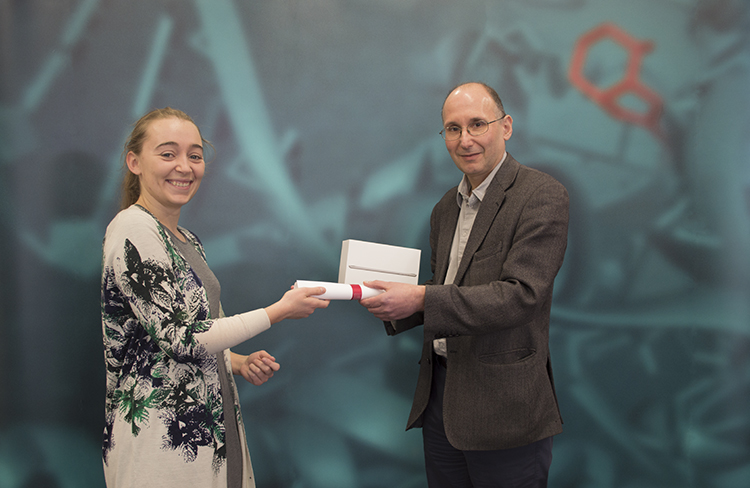Supporting Women in Science

The award has been introduced as part of the Sex in Science programme on the Wellcome Genome Campus, which tackles issues traditionally facing women in science, and drives policy and practice changes to redress them. Ms Huckins received her award for inclusiveness and dedication to championing STEM careers; Dr Overington of EMBL-EBI received his for supporting parents by encouraging a healthy work-life balance.
Everyone on campus, scientific and non-scientific alike, were invited to nominate a colleague who had made a positive difference to women’s careers. Ms Huckins, a PhD student at the Sanger Institute, was recognised by a colleague because of ‘her commitment to the Sex in Science program and Athena SWAN at Sanger, as well as to the Women’s Campaign at the University of Cambridge’ and because, ‘she seeks the involvement of the PhD students in these actions, increasing awareness of the issues in the coming generation of scientists (men and women), and encouraging us to reflect on what we can do to make a difference for ourselves and others at a pivotal point in our careers where many women choose to leave STEM fields.’
“The Sex in Science programme brings the conversation about gender balance to the forefront, making sure we remain committed to equality in science. I’m proud to have been recognised as a proponent of this incredibly important issue.”
Ms Laura Huckins A PhD student at the Sanger Institute
EMBL-EBI team leader Dr Overington was nominated because he, where appropriate and possible, ‘allows and encourages flexible working situations for all his staff, such as working from home or making up the hours at a later stage for instances where childcare falls through’. His openness in communication about children and provision of flexibility means ‘his staff feel confident to carry out their duties and in instances where there are issues with childcare’.
“Our working practices have to be flexible enough to allow men and women to advance their careers while keeping family their top priority. The key is to get job roles in the team right for flexible working from the outset. I’m deeply honoured to have been recognised, even though I feel we could all be doing much more. I’m happy the Sex in Science programme is working to create the right culture to ensure everyone has the opportunity to succeed both scientifically and personally.”
Dr John Overington Team Leader at the EMBL-European Bioinformatics Institute (EMBL-EBI)
The awards, which included an iPad mini, were presented to Dr Overington and Ms Huckins by Professor Dame Janet Thornton, Director of EMBL-EBI, and Professor Mike Stratton, Director of the Wellcome Trust Sanger Institute.
“In line with the theme of International Women’s Day this year, which asks us to ‘Make it Happen’, we wanted to celebrate those who are taking action to encourage women’s advancement in science. Laura and John are perfect examples of the contribution each one of us can make each working day to tackling gender inequality.”
Professor Sir Mike Stratton Director of the Wellcome Trust Sanger Institute
“The leadership of people like Laura and John is helping to transform the way we work on the Wellcome Genome Campus. This award recognises that it is the individuals in our lives who make the big differences, that without mentorship and flexibility some of the greatest minds in science might never have flourished. Actions like Laura’s advocacy of the Sex in Science programme and John’s support of colleagues balancing work and childcare are inspiring, but I was also pleased to see so many people nominating their colleagues for this award.”
Professor Dame Janet Thornton Director of EMBL-EBI
More information
Selected websites
The Sex in Science Programme
The Sex in Science programme is a joint initiative of the Wellcome Trust Sanger Institute and the EMBL-European Bioinformatics Institute (EBI) that aims to generate discussion and raise awareness about issues traditionally facing women in science, and to drive policy and practice changes to redress them. Last year the Sanger Institute became one of the first research institutes to receive an Athena SWAN Bronze Award.
The European Bioinformatics Institute
The European Bioinformatics Institute is part of the European Molecular Biology Laboratory (EMBL), Europe’s flagship laboratory for the life sciences. EMBL-EBI provides freely available data from life science experiments covering the full spectrum of molecular biology, and performs investigator-led research using computational approaches to unravel the secrets of life. Our extensive training programme helps researchers in academia and industry to make the most of the incredible amount of data being produced every day in life science experiments. We are a non-profit, intergovernmental organisation funded by EMBL member states. Our 500 staff hail from 43 countries, and we welcome a regular stream of visiting scientists throughout the year.
The Wellcome Trust Sanger Institute
The Wellcome Trust Sanger Institute is one of the world’s leading genome centres. Through its ability to conduct research at scale, it is able to engage in bold and long-term exploratory projects that are designed to influence and empower medical science globally. Institute research findings, generated through its own research programmes and through its leading role in international consortia, are being used to develop new diagnostics and treatments for human disease.
The Wellcome Trust
The Wellcome Trust is a global charitable foundation dedicated to achieving extraordinary improvements in human and animal health. We support the brightest minds in biomedical research and the medical humanities. Our breadth of support includes public engagement, education and the application of research to improve health. We are independent of both political and commercial interests.


